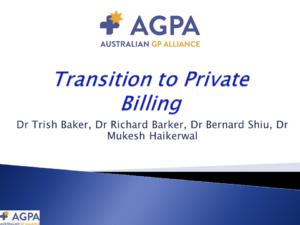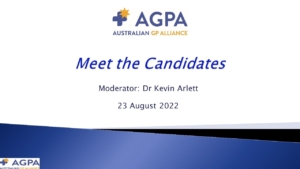AGPA Webinar – Non Medicare Income Streams
Webinar
Tuesday 6 December 2022, 7:30pm AEDT
6:30 pm Queensland, 7:00 pm SA, 4:30 pm WA
AGPA Webinar
Non Medicare Income Streams
Presented by: AGPA
Speakers:
Dr Brenda Murrison, Dr Fiona Raciti, Dr Jared Dart
As part of our Practice Sustainability webinar series AGPA has asked members to discuss some of the options they have followed or considered for their Practices.
Declining Government support for primary healthcare via Medicare has impacted on Practice income and in some cases Practice viability.
A common response has been to move Practice billing to mixed or private billing, but some Practices have also taken the opportunity to develop income streams from non-Medicare sources. These options include other government programs, corporate programs and non-Medicare individual medical demand.
It has involved the services of both GPs and allied health professionals.
The focus of the evening will be the presentation of options that some Practices have pursued and the approach required to achieve beneficial outcomes for Practice income.
The intention is that you will be able to ask the panel questions and contribute your own experience.
https://www.trybooking.com/CEPCN
Places will be limited, preference will be given to AGPA members.
For further information contact the AGPA Secretariat




